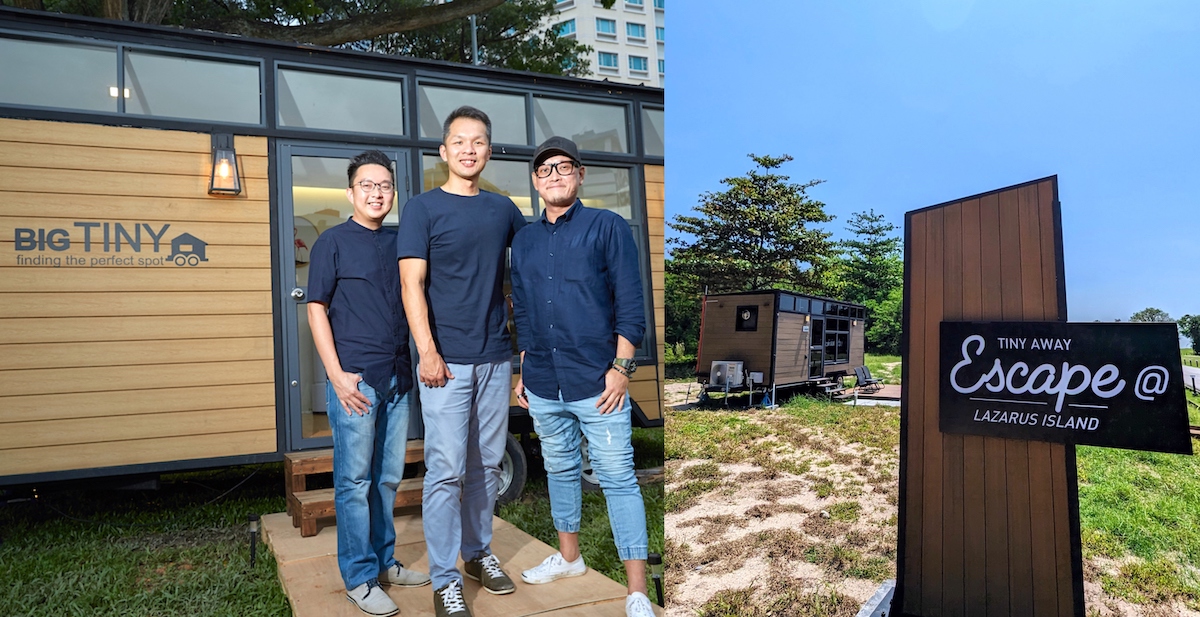In recent years, the tiny house movement has gained significant momentum globally, with more people looking to downsize and live simpler lives. Tiny houses, which are usually less than 500 square feet, are increasingly becoming popular for those seeking a more sustainable and minimalist lifestyle.
One such company that has made a name for itself in this niche market is Big Tiny, which specialises in designing, building, and managing tiny houses.
“It all began in 2017. My primary school friend and co-founder, Adrian Chia, was on holiday in Victoria’s Great Ocean Road, which allowed him to escape the grind of Singapore city life in a tranquil, rural setting,” said Jeff Yeo, co-founder of Big Tiny.
“Returning to Singapore with his army mate Dave Ng, we realised there was a huge opportunity to use the tiny house concept to help rural and regional landowners open their beautiful natural surrounds to a huge market of city dwellers to escape.”
This led the trio to start up Big Tiny, which integrates the concept of tiny houses with eco-tourism to build a sustainable tourism business that both changes and challenges the holiday accommodation landscape.
It is the first company in Singapore to do so, and it aims to provide a unique and comfortable accommodation experience while minimising the environmental impact of traditional holiday accommodations.
The 42-year-old co-founders — who are all graduates from the National University of Singapore — have unique backgrounds across real estate, materials science and environment technology, and business management and marketing.
They started the business with an initial investment of S$100,000 and broke even in its first year of operation. Today, Big Tiny has nearly 200 tiny houses across Australia, New Zealand, Italy, Taiwan, and Malaysia.
Escaping the city life and basking in nature
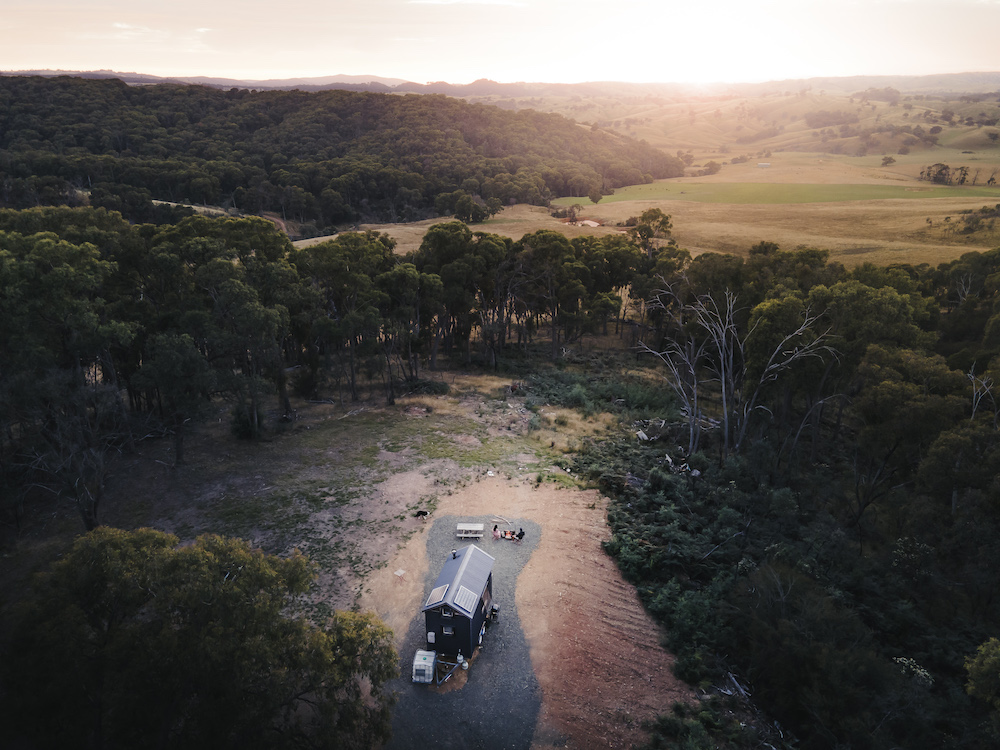
Big Tiny offers travelers the opportunity to disconnect from the hustle and bustle of city life and immerse themselves in nature, while also promoting sustainable practices and supporting local communities.
Some of its most popular tiny house models are Reyes, a 137 square foot, single-level house; and Minimalist, a 192 square foot model, which comes with a loft.
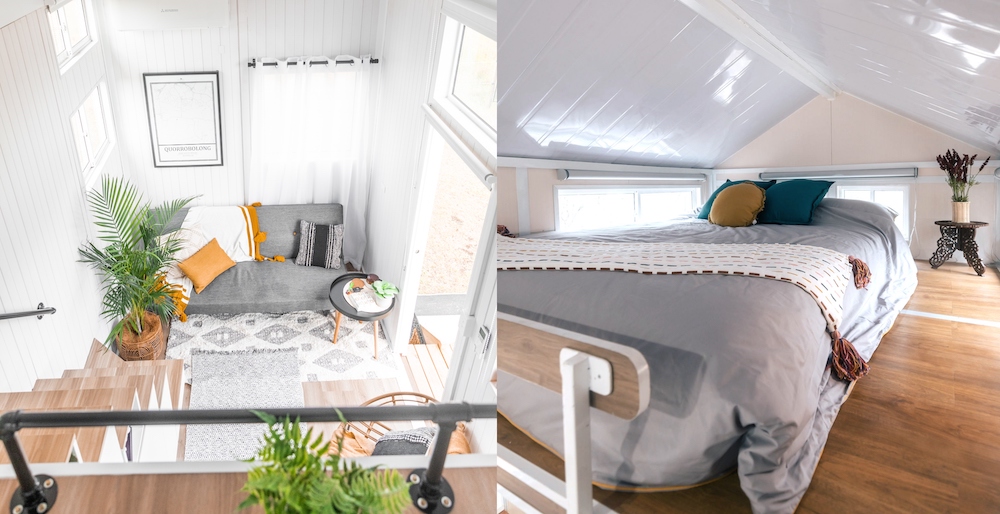
On top of being able to design, build and ship our tiny houses worldwide via our design and construction brand Build Tiny, we also provide hospitality management services to tiny house owners.
This allows people who purchase a tiny house from us to deploy their houses in our key markets — managed by Tiny Away — and earn a share in rental income when they are not using their tiny houses themselves.
On the Tiny Away side, landowners with land can sign up as a land partner and tiny house host, sharing in rental revenue also.
– Jeff Yeo, co-founder of Big Tiny
Its holiday accommodation offering, Tiny Away, offers guests an opportunity to discover nature while staying in comfort in unique and beautiful locations.
What truly sets these tiny houses apart from other accommodation options is their network of local landowner hosts who offer a variety of activities from farm tours and horse riding to bushwalking, wine tastings, and quad biking.
These activities let guests take a break from their hectic city life, allowing them to experience vastly different scenes and ways of life that exist right on their doorstep.
Holistically, Big Tiny’s vision is centred on reducing resource consumption and environmental impact without sacrificing the quality of accommodation.
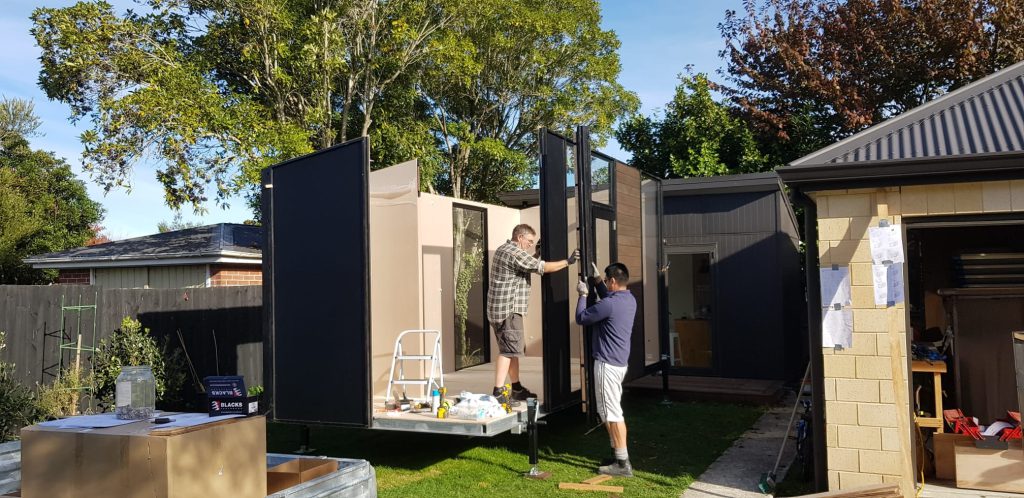
One of the factors that make Big Tiny stand out in the market is its construction methods and modular design principles. The company’s pre-fabricated panels allow for swift manufacturing of tiny house components, which take around three months to produce and under three hours to assemble one tiny house.
Each tiny home is made with sustainable materials, such as reconstituted wood and recycled plastics, and constructed in Australia by experienced builders, plumbers and electricians.
Small rooms and structures require far less energy and fewer materials to build, while the non-permanency of the accommodation structures is designed to preserve the land they inhabit.
– Jeff Yeo, co-founder of Big Tiny
Besides prioritising the use of sustainable materials in its construction process, the tiny homes also has key eco-friendly features such as waterless compost toilets, rainwater collection tanks for showers and solar panels, which help to minimise the energy and water usage of the homes.
As a sustainable travel provider, Jeff admitted that maintaining high standards of sustainability in all aspects of their business operations is crucial for Big Tiny. As such, they continually review and improve their sustainability practices, invest in sustainable technologies, and collaborate with local sustainability experts to minimise their environmental impact.
Big Tiny’s sustainability efforts were recognised through their win at Enterprise Singapore’s Sustainability Open Innovation Challenge in 2021. They were also named as an honouree in the managing environmental impact category at the Brands for Good 2019 Awards.
Tiny houses are a new and unfamiliar concept to most
According to Jeff, the early days of setting up Big Tiny were filled with both excitement and challenges.
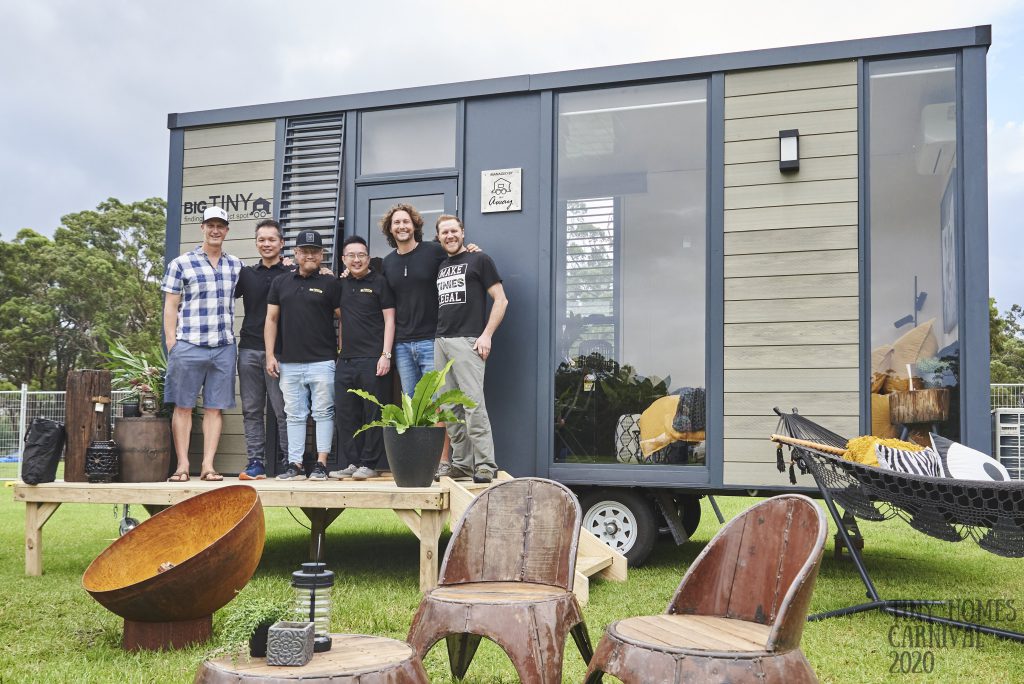
The co-founders had a vision to create sustainable and unique travel experiences, but finding suitable locations for their tiny houses proved to be a major hurdle. They spent many months scouting potential locations and convincing landowners before securing their first location.
Building brand recognition and marketing their concept to potential guests was another challenge, as the idea of tiny house accommodations was relatively new in the market. They relied a lot on building a strong online presence and also established partnerships with other sustainable travel companies, but this took time and effort to increase exposure and reach new customers.
These efforts were fruitful and Big Tiny received a positive response from customers at launch. Their first few tiny house locations in Australia received bookings within weeks of opening, which gave the team confidence in their concept and helped to build momentum for their brand.
As they continue to open new tiny house locations, managing growth is posing to be another challenge. To overcome this, they have focused on building a strong team with expertise in sustainability, hospitality, and customer service.
They also invested in technology and systems to streamline their operations and ensure that they provide the same quality experience to all of their guests, regardless of location.
Furthermore, since Big Tiny is tied to the travel industry, the COVID-19 pandemic also had an indelible impact on its business.
Initially, travel restrictions in Australia led to a decrease in bookings, but as restrictions eased, they saw a big increase in the number of bookings for their tiny house stays. This increase can be attributed largely to the boom in domestic travel, as well as their strategy of positioning themselves as a unique and attainable short stay travel experience.
Travel habits after the lockdowns continued to see an increase in people seeking accommodation that is more private, out in the open and close to nature, so we saw a continued interest in Tiny Away. Travelers also became more compelled to visit parts of the country they had previously overlooked, even though they’re usually within easy reach and have a lot to offer during a short break.
– Jeff Yeo, co-founder of Big Tiny
They’re finally entering the Singapore market
In 2019, there were 45 tiny houses in Tiny Away’s portfolio in Australia, mainly in New South Wales (NSW) and Victoria. This then doubled in 2021 to nearly 100 across NSW, Victoria, Queensland, South Australia, and recently Tasmania.
Today, it has nearly 200 houses across its five markets. But soon, it will be expanding its footprint as it makes its way to Singapore with the launch of Escape@Lazarus.
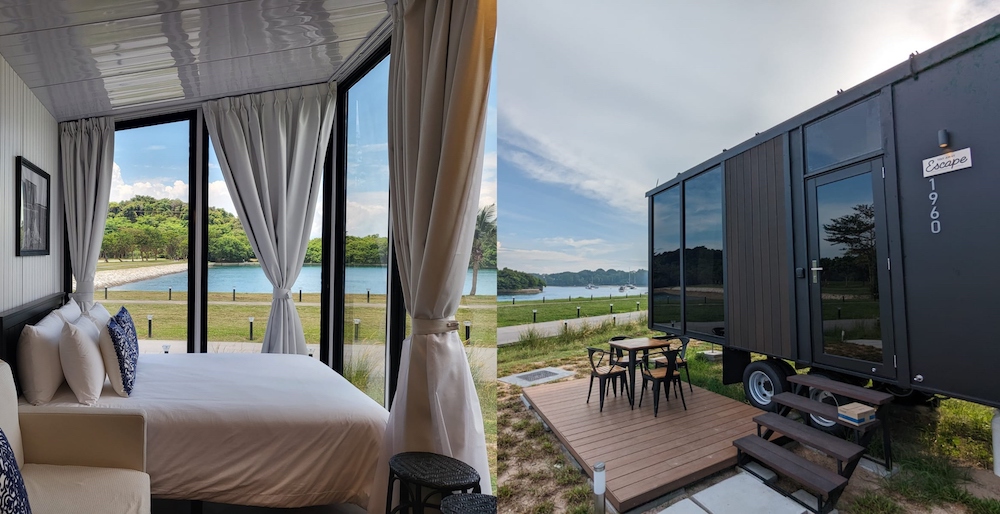
We had the opportunity to work with Sentosa Development Corporation, with support from the Ministry of Trade and Industry through the Pro-Enterprise Panel under the First Mover Framework, to create this new tiny house experience.
[It] will be the first accommodation on the island in its history. We are not only excited, but also proud and honoured to be able to introduce ecotourism experiences to this hidden-gem island destination, which we call home.
– Jeff Yeo, co-founder of Big Tiny
Despite being a new entrant to the Singaporean hospitality market, Big Tiny’s reception has been encouraging. Although bookings officially open in May, more than 600 people have registered their interest in booking the tiny houses.
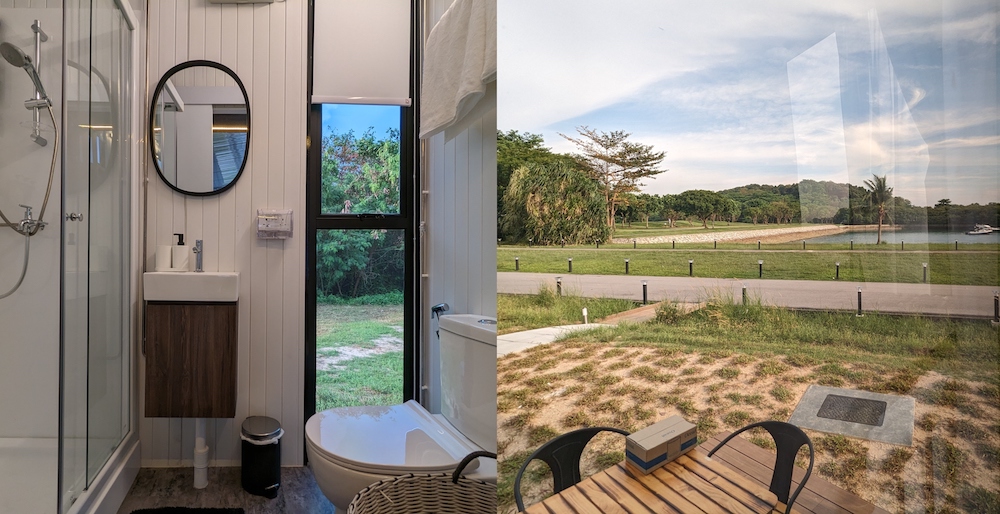
Each unit will be equipped with a kitchen, air-conditioning and Wi-Fi, and can comfortably house up to three adults, or two adults and two children.
The promotional rates will be at S$199 per night for Sundays to Thursdays, and S$249 per night for Fridays and Saturdays. These rates will apply to guests who make their bookings in May 2023, and the price will be valid for stays until 30 June 2025.
In addition to the tiny houses, there will be other new amenities and attractions on the island, such as a convenience store, overnight glamping experiences and non-motorised water activities. These will be launched in phases from around June.
Disrupting travel with sustainable tiny houses
Sharing his vision for the future of travel and hospitality, Jeff believes that the industry will continue to evolve in a more sustainable and responsible direction, as travellers become increasingly conscious of their environmental impact and seek out accommodations that align with their values.
Big Tiny is already positioned to adapt to these changes, with its tiny houses designed to be environmentally friendly.
Looking ahead, I see Big Tiny continuing to lead the way in sustainable tourism and experiential accommodations. We will continue to innovate and incorporate new technologies and materials to further reduce our environmental impact, while also offering our guests unforgettable experiences in stunning natural settings.
– Jeff Yeo, co-founder of Big Tiny
He also shared exciting developments in the works for Big Tiny. The team is currently finishing up its latest project, Tiny Away Escape @ Grampians Edge, which boasts 30 tiny houses in the Grampians region of Victoria.
Big Tiny is also starting work on its next project, Tiny Away Escape @ Great Ocean Road, which promises to offer tiny houses in a breathtaking location.
The company plans to continue to expand its portfolio of tiny house locations across different regions and countries. It also plans to expand its services to include additional experiential activities, such as guided hikes, wildlife tours, and cultural experiences.
Ultimately, Big Tiny’s goal is to be a leading provider of sustainable and responsible travel experiences, recognised as a positive force for environmental and social change in the travel industry.
“We want to inspire others to adopt sustainable practices and create a more sustainable future for travel and hospitality,” said Jeff.
Featured Image Credit: Big Tiny
